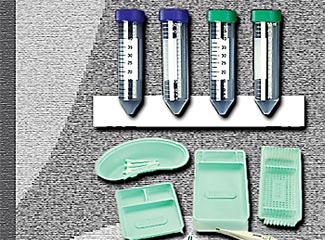Plastics Industry Thrives Despite Automotive, Appliance Troubles
With its ability to cater to different sectors, the outlook for plastics is bright despite storm clouds over automotives and other industries.
June/July 10

Of the 150 plastics processors (injection molders and thermoformers, for instance) that responded to Plante & Moran's survey of the North American plastics industry, fewer than 10 percent indicated that they were still in a contraction phase. A 66 percent majority described themselves as surviving or maintaining in 2009, while 56 percent had a debt to equity ratio of 2:1 or less, and 27 percent reported a strong or unchanged relationship with their banks. While these plastics processors seem stable, 72 percent said the economy would take two or more years to return to normal.
The domino effect of the credit freeze caused customers of these plastics processors to reduce purchase volumes and inventory and begin shopping around for better deals to preserve cash. Sixty-six percent of respondents reported moderate to high levels of new quoting activity, demonstrating more deal-seeking, according to the report. The subsequent loss of revenue by plastic processors was driven more by volume reduction (71 percent lost more than 10 percent of sales due to volume reductions) than by customer bankruptcies or losses to competitors (29 percent lost more than 10 percent of revenue due to these factors).
"The chance of restoring revenue losses from reduced volume is far more likely than restorations of lost customers," Mengel says. "And those who failed to diversify their customer base suffered the most, with 22 percent of respondents losing 15 percent or more of their revenues due to customer bankruptcy or vendor switching."
The plastics industry is the third largest manufacturing industry in the United States, according to the Society of the Plastics Industry. It employs more than 1.1 million workers domestically in approximately 18,500 facilities. The industry creates $379 billion in annual shipments, and had a $10.9 billion trade surplus in 2007. The sector has a presence in every state.
Diversity Shields Recession
Since plastics are a critical component in the manufacture of so many other products, the industry usually doesn't suffer during a downturn for long. Diversity among the customer base drives the success of plastics processors. If business is down in one market segment, it's likely to be up in another. Take the automotive industry. While many plastic components suppliers and moldmakers saw the downturn hit their businesses hard as the automotive industry bottomed out, some turned to what they call a recession-proof market - the medical industry.
Diversified plastics processors emerged better for wear than their automotive-focused counterparts. While a fair number of plastics and moldmaking companies stumbled, the playing field opened up new opportunities for those still standing to gain new business and grow stronger.
Bright Spots
Packaging, while largely resilient to the economic forces the world experienced in 2008 and 2009, has taken some hits. Last year was "characterized as one of significant extremes," Mesirow Financial noted in its Packaging Perspectives 2009 Year-End Review. Bankruptcies and the bottoming out of global markets characterized the first half of the year, while the second half saw "improving stock markets and thawing credit markets." Still, doubt lingers. "Significant short-term and long-term economic uncertainty still exists," Mesirow reported.
But there have been bright spots. The downturn in the global packaging merger and acquisition volume has not been as severe as in the overall market, Mesirow noted. "In fact, due to transaction volume in the second half of the year, the full year totals for 2009 are not that different from those of 2008. The second-half total includes Amcor's acquisition of Alcan's pharmaceutical and specialty packaging assets, [and] Bemis' acquisition of Alcan's flexible packaging assets."
Mesirow's outlook for 2010 predicts the improvement of credit markets, and the company anticipates that private equity investors will become more active in packaging industry transactions. Purchase price multiples should improve from the average 2009 levels as credit markets continue to recover. Additionally, "strategic buyers in the packaging industry have proven that value can be created from well-structured acquisition," according to the report. "Buyers such as RockTenn, Bemis, Pactiv, International Paper, Greif, PCA, and Amcor have all been able to expand markets, products, and earnings through strategic combinations, synergies, and capacity rationalization. We expect all of these forces to continue to drive additional consolidation in 2010."
Project Announcements
Global Polymers Plans Charlestown, Indiana, Headquarters Operations
02/15/2026
Lithium Battery Company Plans Tampa, Florida, Battery Pack Production Operations
01/10/2026
Revere Plastics Systems Expands Clyde, Ohio Operations
12/23/2025
PRET Advanced Materials Expands Johnsonville, South Carolina, Manufacturing Operations
12/19/2025
Baxter Manufacturing Expands Westminster, South Carolina, Operations
11/27/2025
Plastipak Packaging Expands Rapides Parish, Louisiana, Warehousing Operations
11/23/2025
Most Read
-
Top States for Doing Business in 2024: A Continued Legacy of Excellence
Q3 2024
-
Speed Built In—The Real Differentiator for 2026 Site Selection Projects
Q1 2026
-
Preparing for the Next USMCA Shake-Up
Q4 2025
-
The New Industrial Revolution in Biotech
Q4 2025
-
Strategic Industries at the Crossroads: Defense, Aerospace, and Maritime Enter 2026
Q1 2026
-
The Skilled Trades Are Ready for a Digital Future
Q4 2025
-
Amazon’s First Mass Timber Delivery Station Tests the Future of Low-Carbon Logistics
Q4 2025


